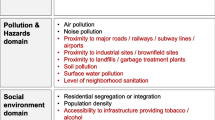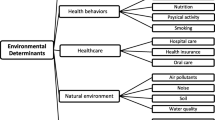Abstract
This paper aims to evaluate the health issues related to urbanization and get an overview of urban health with the bibliometric approach, the powerful tool in quantitatively macroscopic analysis across multiple disciplines. A total of 11,299 articles and 5,579 Medical Subject Headings (MeSH) terms from the year 1978–2012 were retrieved by searching PubMed/MEDLINE using MeSH term “urban health”. The bibliographic information was analyzed to summarize the overall research characteristics. MeSH terms were sorted by their normalized frequency. Top 10 % of the high-frequency MeSH terms were classified into categories (physical environment, health effects, social environment and counter-measures) and analyzed. We investigated the themes and their tendency of the corresponding categories by co-occurrence word (co-word) and regression analysis. We concluded and elaborated nine themes of physical environment, ten themes of health effects, three themes of social environment and four themes of counter-measures in urban health, as well as the main themes in five representative countries (USA, India, China, South Africa and Japan). We present a data-based overview of the issues in urban health, as reference for further researchers.


Similar content being viewed by others
References
An, X., & Wu, Q. (2011). Co-word analysis of the trends in stem cells field based on subject heading weighting. Scientometrics, 88, 133–144.
Archambault, E., & Gagne, E. V. (2004). The use of bibliometrics in the social sciences and humanities, Final Report for the Social Sciences and Humanities Research Council of Canada. Montreal: Science-Metrix Publisher.
Brook, R. D., Rajagopalan, S., Pope, C. A, 3rd, Brook, J. R., Bhatnagar, A., Diez-Roux, A. V., et al. (2010). Particulate matter air pollution and cardiovascular disease: An update to the scientific statement from the American Heart Association. Circulation, 121(21), 2331–2378.
Callon, M., Courtial, J. P., & Laville, F. (1991). Co-word analysis as a tool for describing the network of interactions between basic and technological research: the case of polymer chemistry. Scientornetrics, 22(1), 155–205.
Damyanov, N. D., Witter, D. J., Bronkhorst, E. M., & Creugers, N. H. (2013). Tooth replacement related to number of natural teeth in a dentate adult population in Bulgaria: A cross-sectional study. International Journal of Prosthodontics, 26(1), 34–41.
Jia, X., Guo, X., Li, H., An, X., & Zhao, Y. (2013). Characteristics and popular topics of latest researches into the effects of air particulate matter on cardiovascular system by bibliometric analysis. Inhalation Toxicology, 25(4), 211–218.
Kertesz, S. G., McNeil, W., Cash, J. J., Desmond, R., McGwin, G, Jr, Kelly, J., et al. (2013). Unmet need for medical care and safety net accessibility among Birmingham’s homeless. Journal of Urban Health: Bulletin of the New York Academy of Medicine,. doi:10.1007/s11524-013-9801-3.
Mansiaux, Y., & Carrat, F. (2012). Contribution of genome-wide association studies to scientific research: A bibliometric survey of the citation impacts of GWAS and candidate gene studies published during the same period and in the same journals. PLoS One, 7(12), e51408. doi:10.1371/journal.pone.0051408.
Neff, M. W., & Corley, E. A. (2009). 35 years and 160,000 articles: A bibliometric exploration of the evolution of ecology. Scientometrics, 80(3), 657–682.
Reed, E., Lawrence, D. A., Santana, M. C., Welles, C. S., Horsburgh, C. R., Silverman, J. G., et al. (2013). Adolescent experiences of violence and relation to violence perpetration beyond young adulthood among an urban sample of Black and African American males. Journal of Urban Health: Bulletin of the New York Academy of Medicine,. doi:10.1007/s11524-013-9805-z.
Rotheram-Borus, M. J., Desmond, K., Comulada, W. S., Arnold, E. M., & Johnson, M. (2009). Reducing risky sexual behavior and substance use among currently and formerly homeless adults living with HIV. American Journal of Public Health, 99(6), 1100–1107.
Sarkar, R., Sivarathinaswamy, P., Thangaraj, B., Sindhu, K. N., Ajjampur, S. S., Muliyil, J., et al. (2013). Burden of childhood diseases and malnutrition in a semi-urban slum in southern India. BMC Public Health, 13, 87. doi:10.1186/1471-2458-13-87.
Schwarzer, R. (2008). Modeling health behavior change: How to predict and modify the adoption and maintenance of health behaviors. Applied Psychology, 57(1), 1–29.
Strang, J., Bird, S. M., & Parmar, M. K. (2013). Take-home emergency naloxone to prevent heroin overdose deaths after prison release: rationale and practicalities for the N-ALIVE randomized trial. Journal of Urban Health: Bulletin of the New York Academy of Medicine, 90(5), 983–996.
UN (2009). World demographic trends Report of the Secretary-General, Commission on Population and Development Forty-second session. Economic and Social Council, United Nations.
WHO (2010). Why urban health matters. Urban Health Matters, World Health Day 2010. World Health Organization. http://www.who.int/world-health-day/2010/media/whd2010background.pdf. Accessed 30 June 2013.
Ye, X., Wolff, R., Yu, W., Vaneckova, P., Pan, X., & Tong, S. (2012). Ambient temperature and morbidity: A review of epidemiological evidence. Environmental Health Perspectives, 120(1), 19–28.
Yen, I. H., & Syme, S. L. (1999). The social environment and health: a discussion of the epidemiologic literature. Annual Review of Public Health, 20, 287–308.
Acknowledgments
This study is supported by grants from Basic Research Foundation of Institute of Medical Information & Library, Chinese Academy of Medical Sciences and Peking Union Medical College (CAMS & PUMC) (No. 12R0113), PUMC Youth Fund and Fundamental Research Funds for the Central Universities (No. 3332013087) to Xiaofeng Jia. All the authors declare that they have no financial interest in the findings of this study.
Author information
Authors and Affiliations
Corresponding author
Rights and permissions
About this article
Cite this article
Jia, X., Dai, T. & Guo, X. Comprehensive exploration of urban health by bibliometric analysis: 35 years and 11,299 articles. Scientometrics 99, 881–894 (2014). https://doi.org/10.1007/s11192-013-1220-4
Received:
Published:
Issue Date:
DOI: https://doi.org/10.1007/s11192-013-1220-4




